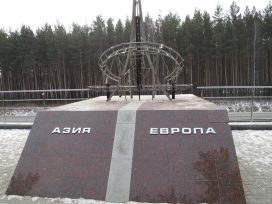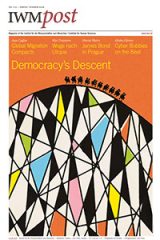

In collaboration with
The Institute for Human Sciences
The Institute for Human Sciences / Institut für die Wissenschaften vom Menschen (IWM) is an independent institute for advanced study in the humanities and social sciences. Since its foundation in 1982, it has hosted more than 1500 scholars, journalists and translators from all over the world. Many of the Institute’s Permanent and Visiting Fellows are regular contributors to Eurozine or its focal points Eurasia in Global Dialogue and Ukraine in European Dialogue (see below).
Website: www.iwm.at
Twitter: @IWM_Vienna
Youtube: IWMVienna

Articles
The Myth of Two Ukraines
A Commentary on Mykola Riabchuk's "Ukraine: One State, two Countries"?
Most intellectuals agree that Ukraine is dramatically polarized along an East-West axis. The differences manifest themselves in linguistic differences and cultural orientation, especially however in different interpretations of the national history. How can this split be overcome in order to avoid a drifting apart between the ‘europeanized’ West and the more ‘russified’ East?
Why Ukrainians Are Ukrainians
A Commentary on Mykola Riabchuk's "Ukraine: One State, two Countries"?
Roman Szporluk comments in this text on Mykola Riabchuk’s concept of ‘ambivalence’ in the Ukraine. The divide betweeen Western and Eastern Ukraine and the resulting ‘ambivalence’ have to be understood in more historical terms: Ukraine has only existed as a political entity since 1991 in contrast to other post – Soviet countries.Therefore, nation building and the emergence of a civil society will take more time.
Richard Hyman discusses the concept of “solidarities” with regard to trade unions. Once the bastion of “solidarity” for the workers’ collective good, they too have to adopt to changes in the workplace, shifting alliances and new realities. As the traditional models of work (and workers) disappear, how can trade unions adopt and what changes do they need to implement?
Political ambivalence as a socio-political phenomenon characterizes virtually every post-communist country but especially the Ukraine. Here, the country’s regional, cultural and linguistic discrepancies and the atomizing impact of Soviet totalitarianism on Ukrainian society serve to explain the deep socio-political rifts within. Mykola Riabchuk argues that the post-Soviet elite currently in power cunningly uses this situation for its political survival. Will the Ukraine be able to overcome this ambivalence and usher into an era of more democratic plurality and subsequent unity?
Focal points

The focal point presents the findings of the project ‘Eurasia in Global Dialogue’ being carried out at the Institute for Human Sciences, Vienna (IWM). The focal point is an extension of the earlier focal point, ‘Russia in Global Dialogue’ that ran in Eurozine and at the IWM from 2012–2018.

Post-revolutionary Ukrainian society displays a unique mix of hope, enthusiasm, social creativity, collective trauma of war, radicalism and disillusionment. With the Maidan becoming history, the focal point ‘Ukraine in European Dialogue’ explores the new challenges facing the young democracy, its place in Europe, and the lessons it might offer for the future of the European project.
Projects and publications

